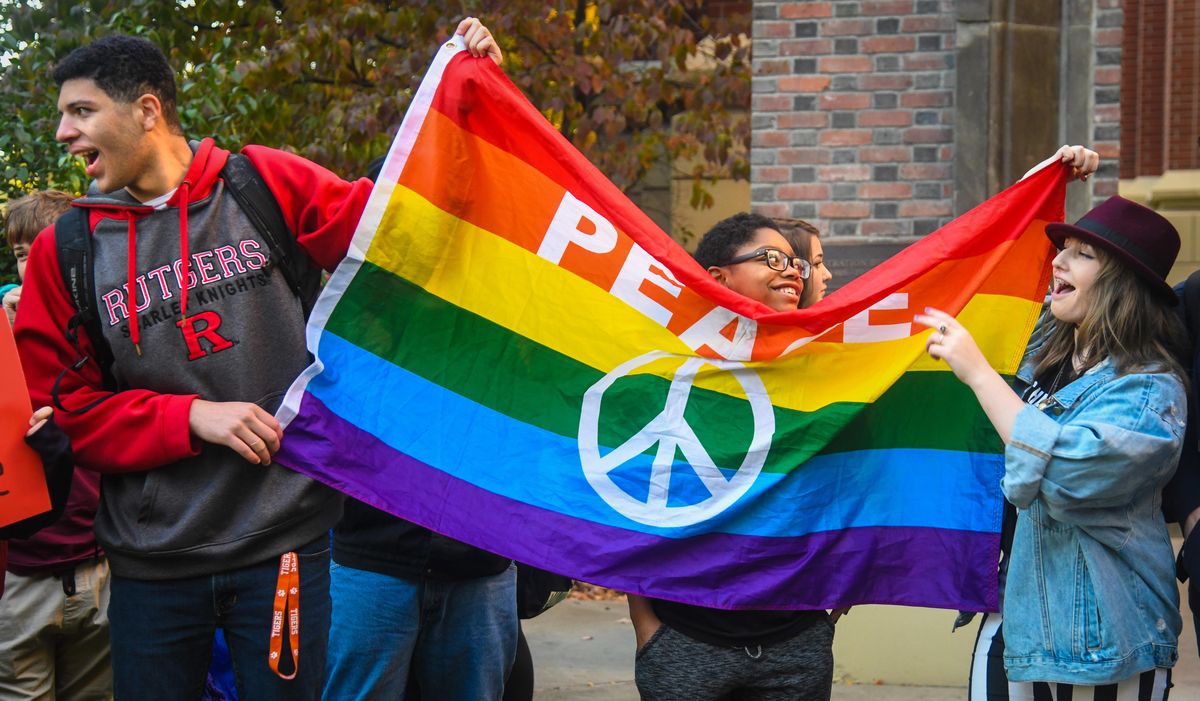This column reflects the opinion of the writer. Learn about the differences between a news story and an opinion column.
Rob Curley: In the face of hate, Spokane showed its strength

I had seen this before.
As a rookie reporter at the Topeka Capital-Journal in the mid-1990s, I watched as the Westboro Baptist Church picketed our newspaper at least once a week.
I passed them on our sidewalk while heading to the next assignment. I always knew they were really fired up about something we had published when the Rev. Fred Phelps himself made the trip to our offices.
Their signs were shocking. And hurtful. And hateful. It’s not that I ever got used to them, I just realized it was best to ignore them … especially if I was on deadline.
Interestingly enough, that was basically how many Topekans reacted to the almost daily protests around our hometown by the church, which was mostly made up of Phelps family members.
It was when the Westboro crew left town to picket some high-profile, celebrity-driven event or a military funeral or when an important speaker was at a neighboring college town that it was harder to ignore them.
When the pickets first began in the early 1990s, the initial instincts of most people in Kansas was to confront them and their message of hate.
And let’s be clear, their message was hate.
At one point in my career at the Capital-Journal, our newspaper was working on a large website that tried to explain Phelps and his church’s complicated history.
This had been a man who was a brilliant and successful civil rights attorney, beginning in the 1950s. Somehow, that powerful message had turned into signs that said “Thank God for 9/11.” And most of their signs were much worse than that.
While working on the paper’s special web section about them, one of Phelps’ daughters called me to say she had seen what we were building on the internet. That link on our news site had been called “Hate for the Love of God” after a series on the church our newspaper published years earlier.
She said we had it all wrong. She said their ministry wasn’t about “hate for the love of God.” She told me it was about “loving God’s hate.”
We immediately changed the name of our site. She was right. She had described a very different God than the one I knew. I also knew our readers would immediately get Westboro’s take on divinity with those three words.
After years of public conflict during the church’s pickets, it started to become clear that the best way to counter their hate was with love.
Love’s tonic showed its power in 1998.
Matthew Shepard was a 21-year-old college student in Laramie, Wyoming. He was killed by two men because he was gay. He was chained to a fence and left to die.
This is the moment when the Westboro Baptist Church entered the national spotlight because it decided to picket Shepard’s funeral. Dressed as angels with huge wings that kept the funeral out of the view of Phelps and his pickets, a community’s love showed us the way.
You combat hate with love.
On the very day it was announced that Matthew Shepard’s ashes would be interred at the Washington National Cathedral, 20 years after his death, Westboro Baptist showed up in Spokane for pickets at Lewis and Clark High School and Gonzaga University.
Our community’s students did Spokane proud.
When it sometimes seems as if we’re living during a time of unsolvable problems and insurmountable differences, it’s inspiring to be reminded that we remain bound by our genuine care for each other.
The students, staff and supporters at Lewis and Clark showed up at their school Thursday morning fully prepared to show the tiny contingent of Westboro Baptist protesters what Spokane is really about: unity, tolerance, respect and kindness.
It’s almost a shame that pickets never showed up to witness it. But, you know, that really doesn’t matter. What matters is that our town has raised legions of great kids who are confident in themselves and their peers.
The students at Ferris High School showed that same resolve when Westboro Baptist picketed there eight years ago. There’s really no doubt future classes will exhibit the same acts of love should the church make the unfortunate decision to return to Spokane.
You see, strength runs deep in Spokane. Westboro’s brand of hatred does not.
But sometimes we need a poke. A test, so to speak. We need a moment to remind us who we really are. We passed that test on Thursday in a rainbow of flying colors.
I told you I had seen this before. Yet this was different.
As polarized as our country seems now, it’s easy to wonder if we’ll ever feel united again. Then you see our students of different backgrounds and beliefs come together to stand up what for what they believe in: each other.
It gives you hope.
